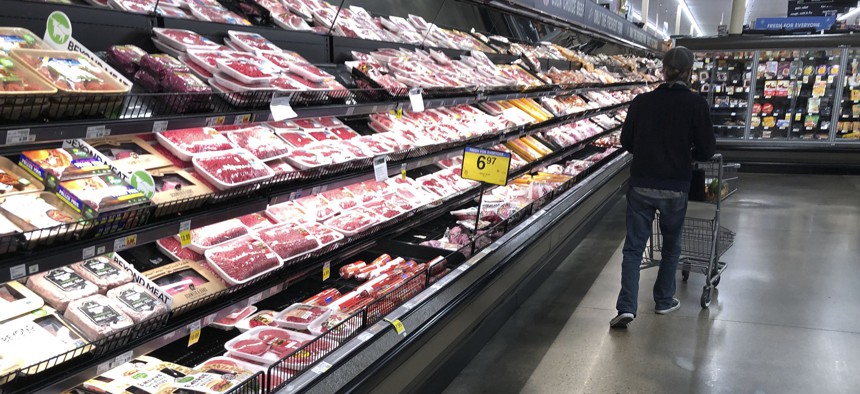USDA Will Appeal Ruling to Block Food Stamp Work Requirements

A shopper pushes his cart past a display of packaged meat in a grocery store Sunday, May 10, 2020, in southeast Denver. AP Photo/David Zalubowski
A federal judge had blocked the USDA from moving forward with requiring more stringent work requirements for the Supplemental Nutrition Assistance Program, saying they weren’t appropriate during the coronavirus pandemic.
The U.S. Department of Agriculture this week filed notice that it will appeal a court order that blocked it from implementing more stringent work requirements for the food stamps program—a move that would cut off an estimated 700,000 recipients at a time of increased food insecurity.
The appeal comes at a time that the USDA has increased the overall monthly Supplemental Nutrition Assistance Program (SNAP) benefits for recipients using money provided through a congressional coronavirus aid package.
The USDA defended its decision to appeal the order on the work requirements rule, which was finalized last year, even as the coronavirus outbreak has pushed unemployment up to historic levels, saying that the current “challenging environment” would not “last forever.”
“USDA has been extremely aggressive in expanding flexibilities to ensure Americans who have been impacted by the coronavirus continue to receive the food they need for themselves and their families,” the agency said in a statement. “America’s best days are ahead and we must prepare our workforce to rejoin the economy when our nation reopens. When America goes back to work, we must be ready to engage our able-bodied SNAP participants so they may achieve meaningful and lasting employment too.”
Last year, the Trump administration proposed three changes to food stamp eligibility that would eliminate benefits for around 4 million people, or approximately 10% of those currently enrolled in the program. The proposals would by and large reduce states’ autonomy in administering SNAP benefits. In addition to creating more stringent work requirements for the program, the other two proposals would do away with automatic enrollments for those on welfare and alter the way utility costs are factored into the benefit analysis.
Nineteen states and the District of Columbia sued the Agriculture Department and Secretary Sonny Perdue in January, arguing the work requirements rule was unlawful.
“The new rule eliminates state discretion and criteria regarding local economic conditions for waiving work requirements, resulting in the termination of essential food assistance for benefits recipients who live in areas with insufficient jobs,” the lawsuit states.
Beryl A. Howell, the chief judge of the U.S. District Court for the District of Columbia, agreed with the states and issued a temporary restraining order in March that prevented the USDA from implementing the work requirements rule in April. The chief judge said that amid the worsening pandemic, it was essential to guarantee “that government officials at both the federal and state levels have flexibility to address the nutritional needs of residents and ensure their well-being through programs like SNAP.”
Current rules limit the length of time that adults under the age of 50, who are not disabled and have no children, can receive food stamps to three months during a three-year-period unless they work at least 20 hours a week. States are able to waive the three-month time-limit in communities with either 10% unemployment or a lack of sufficient jobs.
But the new policy would make it more difficult for states to obtain those waivers. To qualify under the new rule, a community would need to have an unemployment rate above 6% for the previous two years and the rate would need to be at least 20% the national average
Under the administration’s rule, Howell wrote that states would lose the flexibility they need to obtain work requirement waivers for small defined regions that become hotspots in the coronavirus pandemic and would instead have to wait for national or regional unemployment rates to catch up.
House Democrats have sought to expand and protect the food stamps program in their latest $3 trillion coronavirus aid proposal. The proposal would ban the administration from using any funding to implement its work requirements rule.
Further, the bill would allot $10 billion to cover increased participation in the food stamp program and increase the maximum SNAP benefit amount a family could receive by 15%.
Andrea Noble is a staff correspondent with Route Fifty.
NEXT STORY: Indiana Study Sheds Light On Coronavirus Prevalence In State





